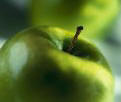Although many may have dismissed the advice
as a cliché, there is now further scientific evidence that
eating an apple a day truly does keep the doctor away.
Chang Y. Lee, professor of food science at Cornell
University's New York State Agricultural Experiment
Station in Geneva, N.Y., and fellow researchers have
identified
bioactive compounds in apples that have strong
antioxidant qualities. These chemicals, most notably the
phytonutrients quercetin and
phenolic acid, promote
effects that may protect brain cells from developing
neurodegenerative diseases such as Alzheimer's and
Parkinsonism.
Lee has been studying apples for the
past two decades, investigating their chemistry and
nutritional qualities, but only in the past year and a
half has his team delved into the exploration of quercetin.
Experiments with rat brain cells have shown quercetin and
phenolics to be principal factors in preventing cell
damage.
"What we found was that the
apple phenolics, which are naturally occurring antioxidants
found in fresh apples, can protect nerve cells from
neurotoxicity induced by oxidative stress," said Lee.
Oxidation arises when abnormal cells
called free radicals attack healthy cells and seize
essential molecular components. Antioxidants neutralize
the production of toxic substances in the body and thus
suppress the damaging assaults by free radicals. Fruits
and vegetables are common sources of antioxidants, and
among those, apples, berries and onions are the best
choices for absorbing quercetin.
The recent studies augment the
accumulating body of knowledge detailing the health
benefits of apples. In 2000, Lee found that phytochemicals
in the fruit boast stronger antioxidant power than vitamin
C against colon and liver cancer cells. In addition, a
2002 report he authored discovered that quercetin fights
cancer activity more effectively than vitamin C.
Lee's study on
apple phenolics,
co-authored by Ho Jin Heo, a visiting fellow at Cornell,
and D.O. Kim, a postdoctoral researcher at the university,
along with S.J. Choi and D.H. Shin at Korea University,
compared two groups of rat neuronal cells. Results
revealed that the experimental group, pretreated with
apple phenolic extracts, fared better against toxic
hydrogen peroxide than the control group.
In the second study, Lee and Heo found
additional evidence to support earlier theories that
quercetin has much stronger antioxidative and
anticarcinogenic qualities than vitamin C. These findings
do not suggest that vitamin C is an insignificant
compound, only that it does not aid in the protection on
neural brain cells.
Prof. David Levitsky, nutritional
science, cautions that it is important not to generalize
the results of these studies. "It was an in vitro study of
... one of the compounds in apples that has antioxidant
properties. We will have to wait for many more animal,
then human studies, before we will know for [certain]
whether eating an apple a day prevents neural
degeneration." Lee also stresses that his studies were
conducted solely in laboratory settings, and that clinical
trials with human subjects have not yet been performed.
"We have a long way to absolutely prove
[quercetin] works the same way in the human brain but
let's say there is great potential," Lee said in a recent
article in the Seattle Post-Intelligencer.
The
apple extracts utilized in the
research are of the red delicious variety and were grown
in upstate New York. The study found that a deeper red
pigment in the apple signified a greater concentration of
quercetin.
Danielle Peress '06, a student of
Levitsky's, found the studies both interesting and
relevant. "I always knew apples were a healthy choice, but
its great having this research document their explicit
benefits."
